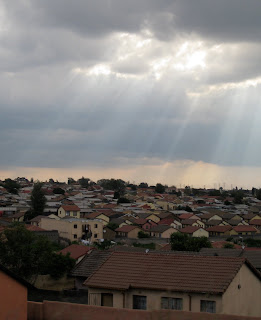A majority of all my actions are motivated by one desire - to get out of the suburbs. I often joke about white suburbia because it is an easy target; I still don't know how to reconcile my appreciation for a perfect childhood with confusion over a sheltered interpretation of reality. Even when asked about my blog title, I explain that it applies most when I am Stateside, it is there I feel most like a foreigner. I chose Furman's study abroad program because I wanted a dramatic break from the lifestyle attached to this package. I recognize this is not a new idea- what kid does not want to differentiate themselves from the familiar? However, what I wanted was complete liberation - not only geographically, but intellectually - ideas that made me so uncomfortable the only solution was to change. My resolution was to study abroad ... as often and as in as many countries as I could.
Needless to say, I was quite pleased with myself after our first week in South Africa. Our theme was quite simply "go big or go home." Our transition was two-fold: our initial accommodations were comfortable while in Johannesburg thanks to the hospitality of St. Benedicts. We had single rooms at the Church guest house, a beautiful garden, daily Mass we could join, and yes, we were in the suburbs. The subtle nature of our transition stopped at the Church gates. Intellectually, it was a plan of shock-and-awe. Day one we heard from a former freedom fighter involved in the anti-apartheid struggle, visited Soweto, the Hector Pieterson Museum and saw President Mandela's home. Careful not to waste precious night hours, we heard a lecture from Dale McKinley - a Furman alumnus whose current claim-to-fame is being kicked out of the South African Communist Party. In addition to briefing us on the anti-privatization movement in South Africa (in preparation for our visit to Orange Farm the following day), he explained how one goes from a former ROTC cadet to a key actor in South African politics. Finally, our first week concluded as our group set out in pairs to experience the authentic South Africa- we were staying with a family for the weekend.
When I learned we would be staying in Soweto for three nights, I was anxious. I couldn't believe that we would be "living" in THE Soweto- famous for its politics, leaders (two Nobel Peace Prize Winners on one street) and its violence. Even knowing the Center for Global Education chooses families not only willing to share their homes, but their life stories, the weekend is an extraordinary test of people skills.
It is only ironic that our first weekend spent in the real Africa was in the suburbs. Most of us, including our professor, expected our homes to be in a lower-income areas (as subsequent home stays were). Soweto is the infamous product of the Group Areas Act, legislation passed by the apartheid government to physically separate the races. The black population was relocated to a specific area to service the white residents. Apartheid legalized structural oppression - the system anchored non-whites in a position of poverty and desolation. The Soweto of today threatens the Africa stereotype - the township synonymous with poverty and tin shacks has evolved into an African suburb with large manicured homes.
Depth was added to the width of my formal studies of South Africa the moment I entered Soweto as a guest. I found a sanctuary of culture, a community alive with a spirit of survival and resistance. I was able to witness normative activities (grocery shopping, visiting family, trips to the mall) as they revolved around historical icons. In spending time with my family, I realized the implications of exactly where I was - we would casually pass by Mandela's house, the streets made famous by the 1976 student uprising or the hostels that bear witness to the horrendous migratory labor system. I was introduced to the face of the struggle at a dinner table in Pimville; I was told of the brother who sacrificed his body for freedom - tortured by the police for his unwavering belief in democracy.
My time spent in one African suburb was sobering - the neighborhood is saturated with resistance. Even the students rose to fight the system; children my age and younger organized themselves in a non-violent protest and were mercilessly gunned down by the police in 1976. The echoes of the fight still ring today in the wake of those died while fighting on the streets. I can only imagine if all neighborhoods were as politicized.

View of Soweto
 During apartheid, pollution from energy sources was released in the black neighborhoods while the residents of Soweto lacked electricity. When energy providers finally serviced Soweto, they were built outside of the township. The useless reactors now serve as a reminder of not only the apartheid legacy, but environmental racism
During apartheid, pollution from energy sources was released in the black neighborhoods while the residents of Soweto lacked electricity. When energy providers finally serviced Soweto, they were built outside of the township. The useless reactors now serve as a reminder of not only the apartheid legacy, but environmental racism The infamous hostels - "housing" for migrant workers mining gold and diamonds
The infamous hostels - "housing" for migrant workers mining gold and diamonds Hector Pieterson Museum in Soweto
Hector Pieterson Museum in Soweto Our adopted family
Our adopted family Trashcan lid used by students as a shield in the '76 uprising
Trashcan lid used by students as a shield in the '76 uprising Johannesburg newspaper from February 2010
Johannesburg newspaper from February 2010 Nelson Mandela's home
Nelson Mandela's home8115 Orlando Street, Soweto
 Johannesburg
Johannesburg Hector Pieterson - Soweto Student Uprising in 1976
Hector Pieterson - Soweto Student Uprising in 1976





